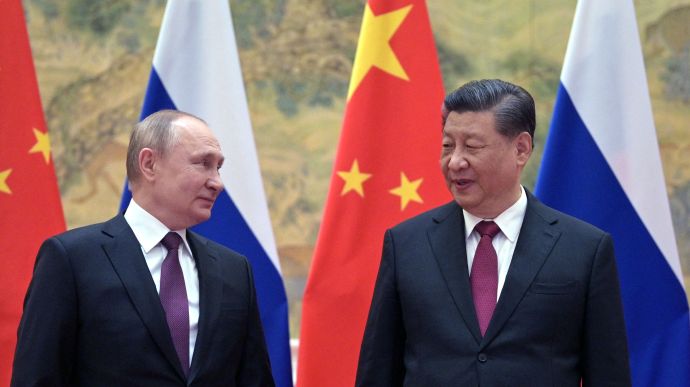According to four U.S. officials and other sources, the US is informing its close allies that it may impose fresh penalties on China if Beijing aids Moscow militarily in its conflict in Ukraine.
The preliminary consultations are meant to rally a number of nations, particularly those in the rich Group of Seven (G7), to consolidate support for any potential limitations.
What particular measures Washington will suggest was unclear. The details of the chats were not previously made public.
A leading agency in the imposition of sanctions, the U.S. Treasury Department, declined to comment.
Recent claims by Washington and its supporters that China was considering arming Russia have been refuted by Beijing. Joe Biden’s advisers haven’t publicly presented any proof.
In person discussions with Chinese President Xi Jinping and U.S. Secretary of State Antony Blinken, as well as a meeting between Wang Yi and other top Chinese diplomats on February 18 in Munich, they have also explicitly advised Beijing against doing so.
According to people with knowledge of the situation, the Biden administration’s initial efforts to oppose Chinese backing for Russia have included informal engagement at the staff and diplomatic levels, including the Treasury Department.
With the core group of nations that were the most supportive of the sanctions put in place against Russia after its invasion of Ukraine a year ago, they claimed officials were setting the basis for potential action against Beijing.
A representative for the White House National Security Council stated that when questioned about the discussions, Russia’s war made it difficult for China to interact with Europe and others.
The official said, “It’s a diversion for China and a potential damage to their international connections that they do not need and should not want.
INTELLIGENCE
According to a representative of a nation that Washington consulted, there is not much intelligence to support the assertions that China is considering providing Russia with military support. Yet, a U.S. official claimed that they were giving their allies comprehensive summaries of the intelligence.
When Biden meets with German Chancellor Olaf Scholz at the White House on Friday, one of the subjects they are likely to discuss is China’s role in the Russia-Ukraine war. Prior to that, the war will be discussed by foreign ministers from numerous nations, including Russia, China, and the United States, in New Delhi on Wednesday and Thursday.
A 12-point statement published by China last week requesting a complete ceasefire was met with skepticism in the West.
The early approach by Washington on penalties did not result in widespread agreement on any particular action, according to the sources.
In the event that any supplies are found to Russia via China, which announced a “no limits” alliance just before the invasion on February 24 of last year, the administration wanted to first raise the possibility of joint sanctions and “take pulses,” according to one source.
A second source acknowledged that there was “serious awareness” on the G7 front but said that specific steps aimed at China had not yet been taken.
A CONFLICT WITH CHINA POSSIBLE?
China President Xi Jinping and Putin loyalist Lukashenko promise to strengthen their defense cooperation. The Belarusian leader’s visit comes as tensions between the US and China have risen recently, including over worries from Washington that Beijing is considering sending lethal aid to the Kremlin’s faltering war effort. Last year, Belarus was used by Russian troops to stage their initial incursion into Ukraine.
A concurrent diplomatic effort by Washington resulted in language urging “third-countries” to “stop giving material assistance to Russia’s conflict, or face serious repercussions” in a G7 statement released on February 24 to mark the war’s one anniversary.
The U.S. placed fresh restrictions on people and organizations suspected of aiding Russia in evading sanctions, despite the fact that China was not specifically mentioned in the announcement. The sanctions included export restrictions for businesses in China and other countries, preventing them from purchasing goods like semiconductors.
Daniel Kritenbrink, the top American diplomat for East Asia, told Congress last week: “We’ve tried to express very clearly, first in private in Munich, and then publicly, our worries. “We’ve discussed the ramifications and outcomes of such behavior. Additionally, we are aware that a large number of our allies hold similar worries.”
The fact that China is deeply ingrained in the major economies of Europe and Asia, complicated the negotiations, is one of the difficulties the United States confronts in imposing sanctions on the second-largest economy in the world. Allies of the United States, from South Korea to Germany, are wary of angering China.
The Biden administration does have the option of economically limiting private actors within China, according to Anthony Ruggiero, a sanctions expert under previous President Donald Trump, and doing so might discourage the government and banks from offering more help.
Then, said Ruggiero, who is now with the Foundation for Defense of Democracies organization, “the administration can send messages to China in public and in private, with the latter being more explicit,” that the U.S. will intensify the sanctions and target Chinese banks with all of its available tools.
Ruggiero argued that, similar to the sanctions against Iran and North Korea, Washington should force China to decide between access to the US financial system and supporting Russia’s war.

